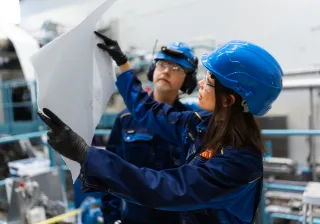Kiilto wanted to better understand its role in contributing to a socially sustainable society. VTT helped the company understand the broad concept of social sustainability so that it can meet the growing demands of stakeholders and legislation.
Key facts
Advanced the social sustainability and responsibility of Kiilto.
Clarified the themes and content related to social sustainability and responsibility in the company’s operations and in relation to its stakeholders.
Supported Kiilto's social responsibility development programme "Our Promise to the People".
Kiilto is a growing, family-owned company with over a hundred years of history. The company produces and sells chemical industry solutions in four business areas: construction, industrial adhesives and fireproofing, professional hygiene and consumer goods. Kiilto has over 800 employees in nine countries.
Understanding the social dimension
Especially since 2018, Kiilto has invested heavily in developing its environmental responsibility.The company created a "Our Promise to the Environment" programme that aims, for example, to use more environmentally friendly raw materials, to engage more in the circular economy and to use energy efficiently. With the growing demands of stakeholders and legislation, the need arose in the company to understand and document the themes related to social sustainability and responsibility accordingly.
“In order for us to make social sustainability visible, and to be able to discuss the topic in a credible manner, we must have a common understanding of what we are already doing, and what we will invest in in the future. For example, in addition to occupational wellbeing and safety issues concerning the personnel, we especially wanted to identify the impact points of social responsibility related to our supply chain,” says Communications Manager Laura Heinovaara from Kiilto. She adds that the company needs an understanding especially of the effects of social sustainability related to the upstream end of the supply chain.
Heinovaara says that it was important to address the dimensions of social sustainability and responsibility also because the company has taken major steps in expanding its international operations in recent years. There are some big differences between the different operating countries of Kiilto in the ways that responsibility is perceived.
According to Katariina Palomäki, Research Scientist at VTT, developing social sustainability in companies requires a genuine desire to change and transform the world for the better. It's not about an ideology that’s not authentic or polishing a corporate image.
“Development starts with the fact that the company wants to understand the environmental and social effects of its own operations and to run and develop a more sustainable and responsible business, which in part supports the transformation of society into a more sustainable one. Perceiving this and working on all of it requires the company not only to acquire and absorb new information, but also to have the desire and ability to hold internal discussions and make choices. VTT can help with all of these.”
The company needs an understanding especially of the effects of social sustainability related to the upstream end of the supply chain.
A common perception from interviews and workshops
The cooperation with VTT to examine and develop the social sustainability and responsibility of Kiilto began with discussions in core groups of responsibility experts from both organisations. The aim was to define which key figures from Kiilto should be engaged in the planning and whose experience and views are needed in the development work. Based on this, VTT implemented:
- Interviews mapping social sustainability and responsibility
- Workshops for key personnel at Kiilto
- A compilation for understanding social responsibility as a whole and as support for creating the development programme.
Representatives of the company's personnel administration, legal affairs, communications, procurement, management and the owner participated in the interviews that mapped the areas, goals and potential procedures related to social sustainability and responsibility. The interview round opened up perceptions of how the organisation perceives social sustainability and responsibility.
Based on the interviews, two workshops were planned for key personnel. In the workshops led by VTT, based on scientific research and business case examples, different ways of understanding the concepts and dimensions of social sustainability and responsibility were brought up for discussion. In addition, the procedures by which responsibility can be developed in companies were discussed.
The introduction of the first workshop focused on social sustainability and responsibility frameworks, legislation and business case examples. In the working section, the stakeholders of Kiilto were identified and analysed from the point of view of social responsibility. The second workshop focused on the benefits of social sustainability and responsibility, success stories of companies, stakeholder thinking and interaction. With the help of exercises the possible expectations, needs and values of different stakeholders, as well as the implementation methods, evaluation and monitoring of stakeholder cooperation were made more tangible.

Support for creating the “Our Promise to the People” programme
Cooperation with VTT clarified impressions at Kiilto about the themes related to social sustainability and responsibility in the company's operations and in relation to its stakeholders:
- Perceptions on the themes and content related to social sustainability and responsibility expanded and became clearer
- The significance of social sustainability and responsibility specifically for Kiilto was clarified
- The relevance of work related to stakeholders in the development of social sustainability and responsibility became clearer
- The stakeholder perspective supported the "Our Promise to the People" development programme at Kiilto.
The workshops enabled looking at things from a stakeholder's perspective: what value related to social sustainability does Kiilto create for its stakeholders with its operations, and what issues might stakeholders face in their own operating environments in relation to social sustainability and responsibility. The stakeholder perspective supported the definition of Kiilto’s "Our Promise to the People" programme.
“We have utilised the tried and tested ways of working in our previous “Promise to the Environment” programme, such as management models and processes for developing social sustainability as well. Four different areas have been created in the programme – Health and Safety, Inspiration and Competence, Human Rights, and Partnership – which will set the framework for further development work,” Heinovaara says.
Shift in corporate culture
According to Heinovaara, the most rewarding part of the cooperation with VTT was, ultimately, realising and grasping the huge scope of social sustainability. It's about much more than supporting employees’ hobbies or sponsoring a local sports club.
“It was also great to see how, with the increased understanding, people got excited about it. It makes development work easier in the future. On the other hand, we gained confirmation that we are taking things in the right direction. The development work and research on our employee experience that has continued throughout this year is definitely also part of social responsibility.”
“The workshop discussions also clarified for the company that social sustainability and responsibility do not only mean the collection of information, reporting and individual actions,” comments VTT's Senior Scientist Marinka Lanne. “Rather, they form an entire system, the development of which starts with the company's worldview, values and identity.”
“Thus, in developing sustainability and responsibility – in addition to knowledge – thinking skills, motivation, stakeholder engagement, recognising threats and opportunities, as well as looking to the future are all necessary. It is largely about the ability of the corporate culture to adopt new ideas and strengthen the importance of social sustainability. This requires constant discussion and fearless confrontation of conflicts,” Lanne says.
The workshop discussions also clarified for the company that social sustainability and responsibility do not only mean the collection of information, reporting and individual actions.
Interested in advancing social sustainability through your organisation? Read our blog on how social sustainability has become a cornerstone of business.








